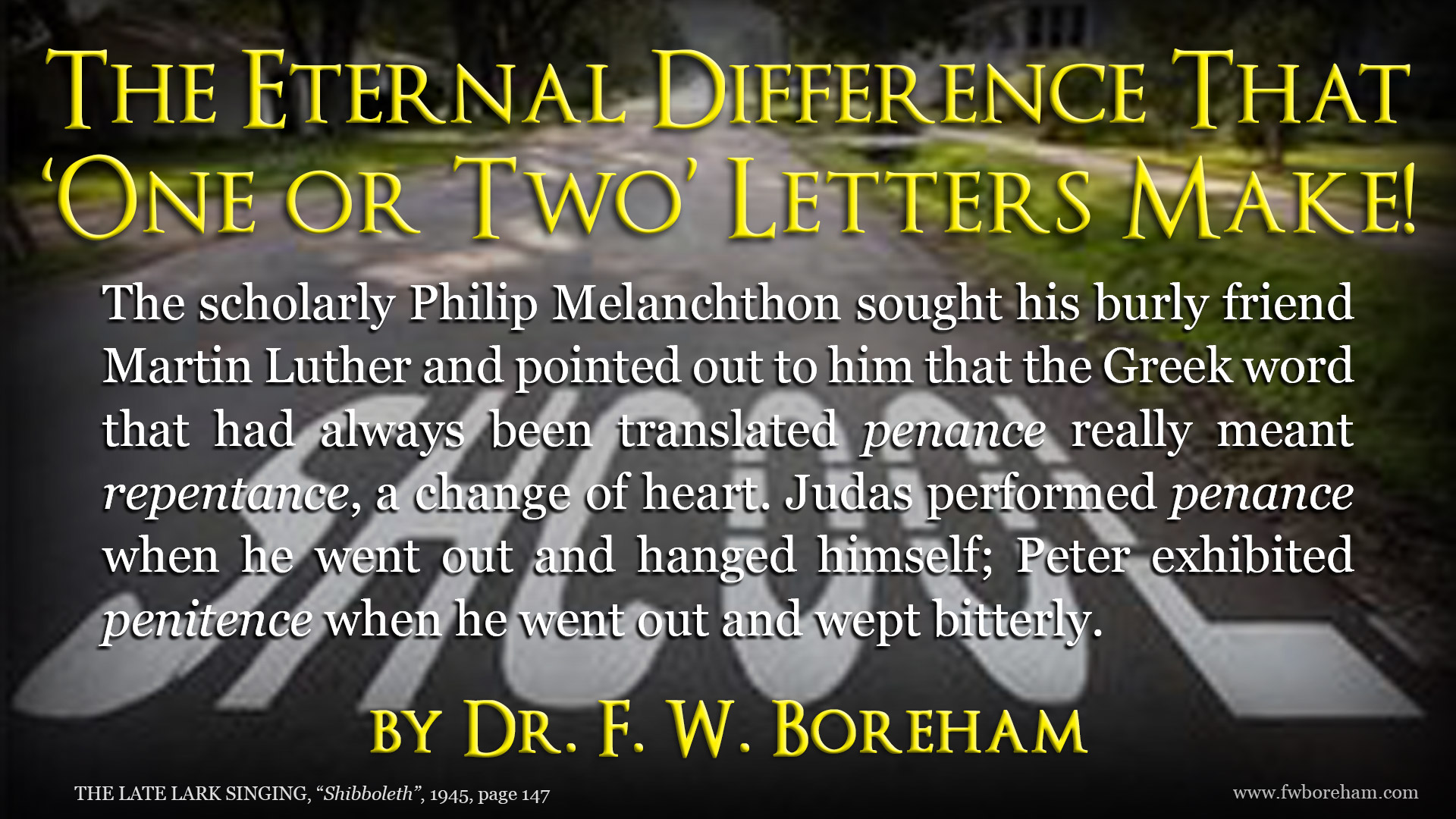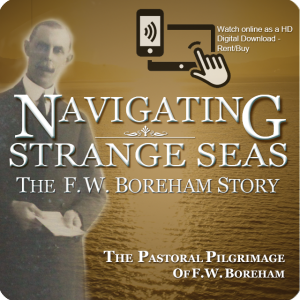home > books by FWB > 1945, A Late Lark Singing > Shibboleth
Part Three
Chapter I
Shibboleth
Is there, even in the Old Testament, a lovelier picture than that moving scene in which Joseph brings his two sons, Ephraim and Manasseh, to his father’s bedside to receive the old man’s dying benediction. Laying one withered and trembling hand upon the head of Ephraim and the other upon the head of Manasseh, the departing patriarch exclaimed: ‘The Angel which redeemed me from all evil bless the lads! And let my name be named on them, and the name of my fathers, Abraham and Isaac! And let them grow into a multitude in the midst of the earth!’
They did. They each became a multitude. And, five or six centuries later, war broke out — civil war-between the descendants of these two boys. In the interval they had lived apart. And, as is invariably the case with peoples of the same blood who occupy separate territories and have few communications with each other, they developed distinctive dialects.
The same thing happened in our own history. Our people were scattered over the British Isles. Means of communication, and even of correspondence, were few. As a consequence, the English came to speak the language in one way, the Scots in another, the Irish in another, and the Welsh in yet another.
Ian Maclaren tells how, when John Carmichael settled as minister at Drumtochty, he brought with him a housekeeper of whose origin the folk of the glen were very suspicious. Was she English or was she Scots? It was difficult to say. She spoke like a Scots-woman who had lived many years in England, but then again she might easily be an English-woman who had spent many years in Scotland. Mrs. Macfadyen called at the manse in an endeavour to solve the problem, but she was unable to furnish the glen with a satisfactory report.
‘I watched for a word that would tell her tongue,’ explained this good lady, but no conclusive word was uttered. Mrs. Macfadyen thought the word ‘church’ would settle it; but it failed.
She didna say “chich”, so she’s not English-born: an’ she didna say “churrrch”, so she’s been oot o’ Scotland.’
‘Wurk would be a gude handy test,’ suggested Jamie Soutar; and Mrs. Macfadyen agreed; but she had been unable to coax the minister’s lady into attempting it. As everybody knows, an Englishman puts an ‘r’ into ‘work’ as a cook puts a quince into an apple pie, but a Scotsman puts so many ‘r’s’ into it that it resembles an apple pie that is all quinces.
Exactly thus was it with the sons of Ephraim and Manasseh. Among the peculiarities of speech that they had developed in the course of their centuries of separation was the loss, by the Ephraimites, of their ability to pronounce the ‘sh’ sound. In the course of the civil war, a host of Ephraimites was trapped. To escape, they would have to cross a certain stream. In crossing the stream they would naturally pretend that they belonged to the tribe of Manasseh. How could such a deception be prevented? To each man, as he approached, the guards said, ‘Say Shibboleth!’ But the unfortunate Ephraimites could only say ‘Sibboleth!’ And there fell that day forty and two thousand men.
I
The point is, of course, that, like the distinction between Shibboleth and Sibboleth, a thing may be very small in itself; but it may be indicative of something really tremendous.
On the night of September 10, 1759, a watcher on the banks of the St. Lawrence might have seen a tall young man in military uniform tossing straws into the river and watching their movements as they drifted to and fro. Surely an absurd occupation for a grown man, and a high officer at that! But James Wolfe is preparing for the attack that, within a few hours, he proposes to make upon the Heights of Abraham! Upon his exact knowledge of the tides may depend his capture of Quebec, his addition of Canada to the British Empire, and his establishment of our authority in the Western Hemisphere.
Or let us exchange the mighty St. Lawrence for a very different stream. And here we are at Ettrick-Sir Walter Scott’s Etrrick, James Hogg’s Ettrick, William Wordsworth’s Ettrick, Thomas Boston’s Ettrick. Lockhart tells us that Sir Walter Scott was one day strolling along the heather-clad banks of a stream in the Etttick Valley when he came upon Mungo Park standing on a rock at the water’s edge, tossing pebbles into a deep pool and intently watching the bubbles as they rose to the surface.
‘This appears to be an idle amusement for a man like you!’ observed Sir Walter.
‘Not so idle as you think!’ retorted Mungo Park.
And he explained that it was by these experiments with the pebbles and che bubbles that he learned to ascertain the depth of a river. And many a time, in the course of his historic expeditions in Africa, that knowledge was a matter of life and death to him. Mungo Park opened up that romantic era of African exploration that subsequently led to the adventures of Speke and Grant and Burton and Stanley and Livingstone. But he might easily have perished almost as soon as he landed in the dark continent, but for the secrets that the pebbles and the bubbles had whispered to him.
Or take another incident. I was in London in 1888, when the Parnell Commission became the centre of world-wide excitement. Lord Frederick Cavendish, the Secretary of State for Ireland, and Mr. Burke, the Under-Secretary, had been murdered by Fenians in Phoenix Park, Dublin. The London Times charged Mr. Parnell, leader of the Irish Party in the House of Commons, with complicity in the crime; and, to prove it, published a photograph of a letter in Mr. Parnell’s handwriting condoning and approving the murders. Mr. Parnell at once declared that the letter was a forgery, and the Parnell Commission-one of the longest and most sensational legal cases of all time-was set up. It ended dramatically.
The Times had bought the letter from a man named Pigott for about five thousand pounds. Pigott claimed to have purchased the letter in Paris. Everybody felt that the crucial moment would come when Pigott, in the witness-box, was subjected to the merciless cross-examination of Sir Charles Russell. The Great day came. On Wednesday, February 20, 1889, it was known that, immediately after the luncheon adjournment, Pigott would face his ordeal.
To the astonishment of the Court, Sir Charles Russell simply handed Pigott—a squat, corpulent, frock-coated figure, obviously extremely nervous—a sheet of paper. ‘Mr Pigott,’ he said, blandly and politely, ‘would you be good enough, with my Lords’ permission, to write some words for me? Perhaps you will sit down in order to do so!’ He then dictated several words—‘livelihood’, ‘likelihood’, ‘proselytism’, and so on. And finally, as if it were purely an afterthought; he added the word ‘hesitancy’. Then amidst breathless silence, he took the sheet of paper from the witness. Everybody could see from his expression that Sir Charles Russell had got what he wanted, and some even heard Frank Lockwood, Russell’s junior, who had glanced at the document, exclaim: ‘We got him!’ Pigott had spelt the word ‘hesitency’. The same word was misspelt in the same way in the letter in The Times! Pigott left the box—and blew his brains out. The case that had absorbed the attention of the world had reached its climax and conclusion in the substitution of an ‘e’ for an ‘a’! As in the tragedy of the Ephraimites, it was a case of a single letter. Hesitancy: hesitency. Shibboleth: sibboleth. What does it matter? But see how much it reveals!
II
Might! Right! It is merely case of a letter. But at this moment millions of men are hazarding their happiness, their homes, their wealth, their very lives to prove that two words are not synonymous. Might is not right! And rather than bow down to the champions of Might, men who love Right will gladly die.
Penance! Penitence! Historians of the Reformation have declared that one of the greatest days in the history of the world was the day on which the scholarly Philip Melanchthon sought his burly friend Martin Luther and pointed out to him that the Greek word that had always been translated penance really meant repentance, a change of heart. Judas performed penance when he went out and hanged himself; Peter exhibited penitence when he went out and wept bitterly.
Reformation! Regeneration! They look very much alike, But are they? Reformation is a change of clothes, an outward transformation. Regeneration is a new birth, the remaking of the entire man.
Reformation is a veneer. Regeneration is the most sublime, the most mysterious, the most majestically miraculous operation that our little world ever witnesses. It is altogether mystical and altogether incomprehensible. The wind bloweth where it listeth, and thou hearest the sound thereof, but canst not tell whence it cometh nor whither it goeth.
So is every one that is born of the spirit. A conversion is the evidence of the mighty ministry of God the Father, God the Son, and God the Holy Ghost in the theatre of the human soul. A conversion represents the enactment of the first chapter of Genesis all over again, In every conversion the heavens and the earth are created afresh. The soul is without form and void, and darkness is upon the face of the deep. Then the Spirit of God moves upon the face of the waters. And God says: Let there be light! And there is light. Out of chaos there comes order; out of a repulsive shapelessness there arise forms of grace and comeliness and beauty; out of deadness and insensibility, life and emotion spring into rapturous being.
Shibboleth! Sihboleth! Right! Might! Penance! Penitence! Reformation! Regeneration! In each case it is only a difference of a letter or two. Yet what eternities and infinities occupy that chasm! It reminds me of a story that, in his monumental Analecta, Wodrow tells concerning a devout and fervent little minister who, once a year, visited a distant parish to assist the local minister at his great annual Communion. On the road he was accustomed to alight from his grey pony at a little wayside inn that nestled in a lonely hollow out among the rugged and heather-covered hills. When he drew rein for the first time at this cosy little hostelry, the daughter of the house tripped out and took charge of his beast. He at once became interested in her. She was a typical Scottish lassie-a bonnie girl with chestnut hair and rosy cheeks and laughing eyes, who did everything in her power to make his visits restful and pleasant. Eager to make the most of his opportunity, the good man engaged the girl in conversation and soon came to close grips on the themes that were nearest his own heart. Unable to lead her to a definite decision, he extracted from her a promise that, until they met again, she would daily offer a prayer that he should teach her. He then instructed her to kneel every night, presenting earnestly the request: ‘O Lord, show me myself!’ On his return a year later he was astonished at the change in her. All the sparkle and the gaiety had vanished: the brightness had left her eyes: a fixed gloom seemed to have settled upon her spirit.
On entering anew into conversation, she could talk of nothing but her wickedness, her waywardness, her faithlessness, and her need. He again tried to persuade her to throw herself upon the Saviour’s mercy; but she could not believe that love so amazing, so divine could be intended for the likes of her. She again promised, however, to offer daily any prayer that he prescribed. He thereupon taught her a petition that differed by only a syllable from the former one. ‘O Lord, show me Thyself!’ And when, the following year, he returned to the inn, he saw in her face, not the roguish and frivolous exuberance of the old days, nor the leaden looks of a year before, but an expression of settled peace and overflowing gratitude. Her first glance told the whole story. The first prayer had brought her to herself: the second had led her to the Saviour.
-F.W. Boreham





















0 Comments